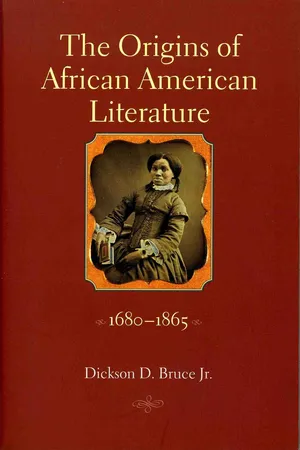
- 374 pages
- English
- ePUB (mobile friendly)
- Available on iOS & Android
The Origins of African American Literature, 1680-1865
About This Book
From the earliest texts of the colonial period to works contemporary with Emancipation, African American literature has been a dialogue across color lines, and a medium through which black writers have been able to exert considerable authority on both sides of that racial demarcation.
Dickson D. Bruce argues that contrary to prevailing perceptions of African American voices as silenced and excluded from American history, those voices were loud and clear. Within the context of the wider culture, these writers offered powerful, widely read, and widely appreciated commentaries on American ideals and ambitions. The Origins of African American Literature provides strong evidence to demonstrate just how much writers engaged in a surprising number of dialogues with society as a whole.
Along with an extensive discussion of major authors and texts, including Phillis Wheatley's poetry, Frederick Douglass's Narrative, Harriet Jacobs' Incidents in the Life of a Slave Girl, and Martin Delany's Blake, Bruce explores less-prominent works and writers as well, thereby grounding African American writing in its changing historical settings. The Origins of African American Literature is an invaluable revelation of the emergence and sources of the specifically African American literary tradition and the forces that helped shape it.
Frequently asked questions
Information
Index
Table of contents
- Cover
- Title
- Copyright
- Contents
- Preface
- Acknowledgments
- Background to an African American Literature, 1680–1760
- The Age of Revolution, 1760–1800
- Literary Identity in the New Nation, 1800–1816
- The Era of Colonization, 1816–1828
- The Liberator and the Shaping of African American Tradition, 1829–1832
- Literary Expression in the Age of Abolitionism, 1833–1849
- African American Voices in the American Crisis, 1850–1861
- The War for Emancipation and Beyond
- Notes
- Works Cited
- Index